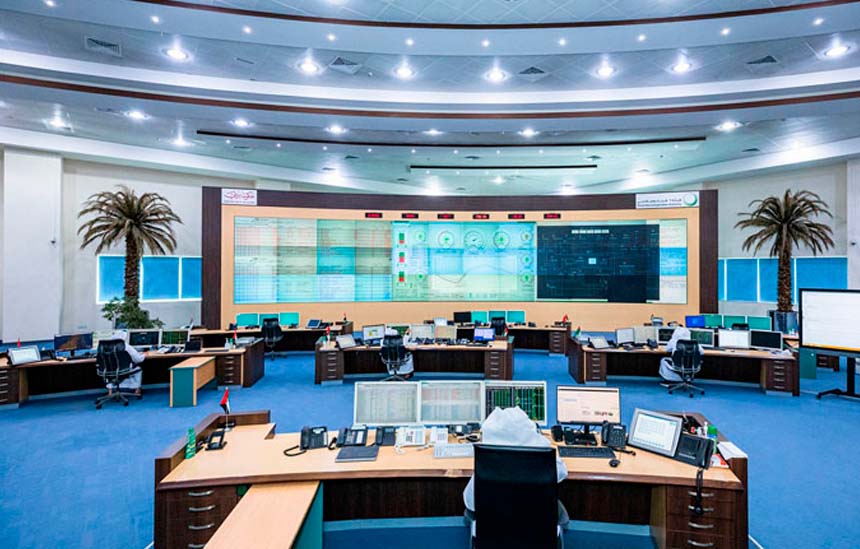Dubai Electricity and Water Authority (DEWA)’s investment in the latest systems and innovative solutions in the water sector has contributed to saving 5,620 million gallons of water, which is equal to AED 225 million, from 2013 until the end of 2023. DEWA relies on innovation, research, disruptive technologies, and the latest tools for anticipating the future. Through this, DEWA has recorded the world’s lowest percentage in water network losses. In 2023, water network losses were reduced to 4.6% compared to around 15% in North America. The systems and technologies adopted by DEWA to monitor and control the water network include the Supervisory Control and Data Acquisition (SCADA) Centre; the Smart Grid; the Hydronet project; Water Smart Distribution Management System (SDMS); Smart Ball technology; pressure management and district metered systems to identify areas with leaks; automation and digital transformation projects; acoustic technology (noise loggers, ground microphones, correlators, and hydrophones); and helium gas technology used in distribution pipelines to detect these in the water network.
“We are committed to preparing for the future by relying on innovation, sound scientific planning, and seamless, swift, and effective operation of the smart grid. We use the latest technologies in the generation, transmission, distribution, and control of water networks. We also develop innovative experiences to raise the efficiency and reliability of electricity and water networks to meet the growing demand in Dubai. This enhances Dubai’s social and economic growth. We are keen to provide our services to over 1,211,475 customers in Dubai in accordance with the highest standards of quality, availability, reliability, and efficiency. This supports the Dubai 2040 Urban Master Plan, the Dubai Economic Agenda (D33), and the UAE Water Security Strategy 2036. DEWA has a comprehensive approach to ensure the sustainability of water resources in line with the Dubai Integrated Water Resource Management Strategy 2030. DEWA has an integrated strategy to enhance efficiency and sustainability in water production and use. It adopts a holistic perspective covering the entire water cycle of production, transmission and distribution, ensuring a responsible and forward-thinking approach,” said HE Saeed Mohammed Al Tayer, MD & CEO of DEWA.
“Advanced Technologies play a pivotal role in DEWA’s water infrastructure management. Through the utilisation of smart technologies like advanced sensors and data analytics (SCADA), DEWA ensures real-time monitoring, efficient resource management and swift response to any disruption,” added Al Tayer.
The Supervisory Control and Data Acquisition (SCADA) Centre
In 2023, DEWA launched its third phase of the Supervisory Control and Data Acquisition (SCADA) Centre for both water transmission and distribution at the Al Ruwaiyah BMC building. This is part of its efforts to achieve digital transformation using state-of-the-art operational technology, which includes real-time hydraulic modelling, training simulation system and advanced reporting tools. This enables it to monitor the water network in Dubai remotely around the clock, including the water transmission pipelines, pumping stations and reservoirs sprawling over 3,000 kilometres. This has been achieved by installing over 10,000 smart devices.
Smart Grid
The Smart Grid that DEWA is implementing has total investments of AED 7 billion. The Smart Grid provides advanced features, including automated decision-making and interoperability across the electricity and water network. It is an integral part of DEWA’s strategy to develop state-of-the-art infrastructure for managing facilities and services according to smart and integrated systems using disruptive technologies and Fourth Industrial Revolution applications. The Smart Grid is among the key success factors of smart cities, as it ensures the seamlessness and availability of round-the-clock integrated and connected services.
DEWA replaced electricity and water meters with smart meters between 2015 and 2020. More than two million meters are automatically read, with consumption patterns provided to customers to help them effectively manage their electricity and water usage. It also started operating the Smart Meters Analysis and Diagnosis Centre, where 879,000 smart meters are read and monitored remotely every 15 minutes. This has helped DEWA’s bill accuracy to reach 99.98%. The remote control of smart meters has also identified and handled 1.53 million water leakage cases, and reports were sent to 593,161 customers over the past three years. The number of water accounts reached 1,048,913 accounts by the end of 2023 compared to 995,478 accounts by the end of 2022; an increase of 5.4%.
In order to enhance the security and management of the Smart Grid, DEWA launched several pioneering programmes and initiatives. These include the Smart Grid Data Governance Platform; the Automatic Smart Grid Restoration System (ASGR), the first of its kind in the MENA region; and the Big Data and Analytics platform to integrate smart grid applications and operational technologies, among others.

